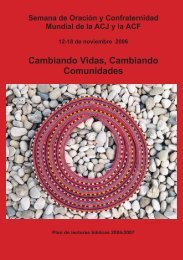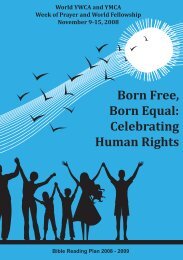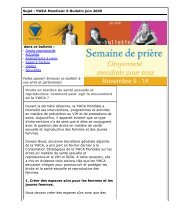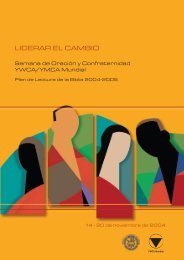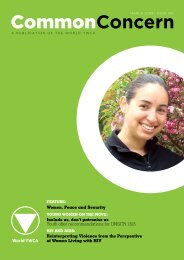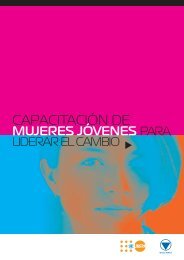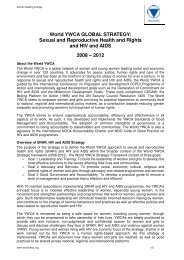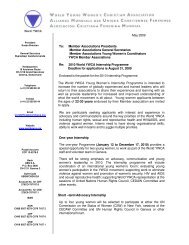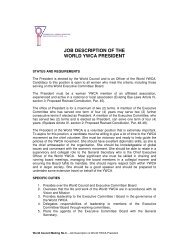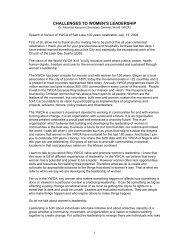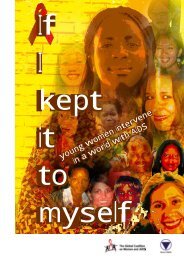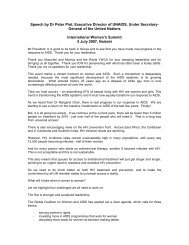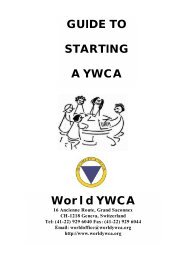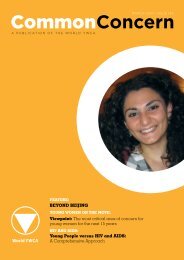World YWCA Let s talk about sex.pdf
World YWCA Let s talk about sex.pdf
World YWCA Let s talk about sex.pdf
Create successful ePaper yourself
Turn your PDF publications into a flip-book with our unique Google optimized e-Paper software.
JUNE 2009 | ISSUE 141<br />
A PUBLICATION OF THE WORLD <strong>YWCA</strong><br />
feature:<br />
<strong>Let</strong>’s <strong>talk</strong> <strong>about</strong> SEX<br />
Young women on the move:<br />
What does <strong>sex</strong>ual and reproductive health<br />
and rights mean to you?<br />
hiv and aids:<br />
Forced and coerced sterilisation of HIV-<br />
Positive Women: A Human Rights Issue
CC 2<br />
Contents<br />
03 | Editorial<br />
04 | <strong>YWCA</strong>s Around the <strong>World</strong><br />
In this briefing, we highlight the work<br />
<strong>YWCA</strong>s are doing to ensure women’s<br />
<strong>sex</strong>ual and reproductive health and rights.<br />
18 | Sexual Exploitation and Violence<br />
Against Women<br />
Breaking the Poto Mitan of Haitian Society<br />
HIV and aids<br />
19<br />
Forced and coerced<br />
sterilisation of HIV-Positive<br />
Women: A Human Rights Issue<br />
Guaranteeing women’s human right to<br />
free and informed reproductive healthcare<br />
decision-making<br />
Feature<br />
6<strong>Let</strong>’s <strong>talk</strong> <strong>about</strong><br />
SEX<br />
Ensuring women’s human right to<br />
healthy <strong>sex</strong>ual and reproductive lives<br />
Take Action<br />
11 | Looking through the cross at<br />
violence against women<br />
12 | Pregnancy Matters<br />
Maternal mortality and the human rights<br />
of women<br />
Young Women on the Move<br />
14 | What does <strong>sex</strong>ual and reproductive<br />
health and rights mean to you?<br />
Leading Change<br />
16 | Higher education, higher risks<br />
<strong>YWCA</strong> of Ethiopia responds to university<br />
women’s <strong>sex</strong>ual and reproductive health<br />
needs<br />
Briefing<br />
21 | From the <strong>World</strong> <strong>YWCA</strong><br />
23 | People<br />
23 | Supporters<br />
President: Susan Brennan General Secretary: Nyaradzayi<br />
Gumbonzvanda Editor: Kaburo Kobia Co-ordinators: Sarah<br />
Davies, Sylvie Jacquat Distribution: Fiona Wilkie. Articles may be<br />
freely reproduced with acknowledgement to <strong>World</strong> <strong>YWCA</strong> Common<br />
Concern ISSN 1025-4099. All artwork, images and photography<br />
is protected by copyright and may not be reproduced without<br />
permission. ©2009 <strong>World</strong> <strong>YWCA</strong>.<br />
Common Concern is published in French and Spanish, contact<br />
worldoffice@worldywca.org to order.<br />
On the Cover: Moo Moo Hsoe<br />
<strong>World</strong> <strong>YWCA</strong> Intern 2009 and Assistant<br />
programme Secretary at the <strong>YWCA</strong> of Myanmar.<br />
www.worldywca.org
CC 3<br />
Editorial<br />
Daily, the world is confronted<br />
with staggering statistics<br />
related to women’s health:<br />
an unacceptable number<br />
of girl-child marriages, women dying in<br />
childbirth and young women exposed<br />
to <strong>sex</strong>ually transmitted infections and<br />
HIV. In many countries women and girls<br />
face violence and abuse resulting in<br />
gross violations of their human rights.<br />
Female genital cutting or mutilation,<br />
honour killings, forced sterilisations,<br />
criminalisation of HIV transmission all<br />
speak to the daily horrors many women<br />
face condoned by culture, customs,<br />
misapplication of religious norms and<br />
legislation.<br />
The <strong>World</strong> <strong>YWCA</strong> has, in the last<br />
decade, intensified its interventions,<br />
programmes and activities around<br />
HIV prevention and care. It is now<br />
evident that such interventions remain<br />
incomplete unless framed in a way<br />
that equally respond to <strong>sex</strong>ual and<br />
reproductive health and rights of<br />
women and young people. Violence<br />
against women is the ultimate<br />
manifestation of women’s lack of<br />
access to their rights. In February<br />
2009, the <strong>YWCA</strong> held a consultation<br />
on <strong>sex</strong>ual reproductive health and<br />
rights (SRHR) with a number of<br />
member associations and partners<br />
who collectively defined an approach<br />
for the <strong>YWCA</strong> movement to adopt. The<br />
proposed strategy guides the <strong>YWCA</strong><br />
in creating change in our communities<br />
and addressing laws and norms<br />
related to the triple challenge of<br />
<strong>sex</strong>ual and reproductive health and<br />
rights, HIV and violence against<br />
women (VAW).<br />
With the revised approach,<br />
the <strong>World</strong> <strong>YWCA</strong> is focusing<br />
on comprehensive prevention,<br />
comprehensive support and care<br />
within safe spaces for women and<br />
girls and a commitment to building<br />
evidence through documentation,<br />
monitoring and evaluation.<br />
The series of regional training<br />
institutes on SRHR, HIV and VAW that<br />
the <strong>YWCA</strong> movement is hosting in the<br />
next two years attest to our investment<br />
in a coherent global response<br />
while equipping individual women<br />
leaders with skills and tools to deliver<br />
at the local level and within their<br />
communities.<br />
While the <strong>World</strong> <strong>YWCA</strong> makes<br />
its own contributions, the movement<br />
continues to ask for accountability<br />
and commitment towards actions<br />
that invest in women and girls,<br />
uphold their human rights and<br />
end stigma and discrimination.<br />
The International Conference of<br />
Population and Development (ICPD)<br />
held in Cairo in 1994 concluded with<br />
pledges to achieve universal access<br />
to reproductive health services for<br />
every one in all countries by 2015.<br />
The Millennium Development Goals<br />
echo the ICPD goals and call for<br />
a specific commitment to reduce<br />
maternal mortality by 2015. Next year,<br />
the world will review the commitment<br />
government leaders made in the<br />
2001 Declaration of Commitment<br />
on HIV and AIDS. As advocates for<br />
women’s health, we must not only hold<br />
our leaders accountable for these<br />
promises, but also find ways to ensure<br />
they are achieved.<br />
In this issue of Common Concern<br />
we explore what SRHR means<br />
and how member associations,<br />
women leaders and civil society<br />
can contribute to a safe world free<br />
of violence and free of HIV where<br />
women’s reproductive health and<br />
rights are respected. •<br />
Nyaradzayi Gumbonzvanda<br />
General Secretary, <strong>World</strong> <strong>YWCA</strong><br />
www.worldywca.org
CC 4<br />
<strong>YWCA</strong>s Around<br />
the <strong>World</strong><br />
Since 1855, <strong>YWCA</strong>s around the world have championed women’s rights. <strong>YWCA</strong>s work<br />
within their local context to find solutions that work for the women and girls in their community.<br />
In this briefing, we highlight the work <strong>YWCA</strong>s are doing to ensure women’s <strong>sex</strong>ual<br />
and reproductive health and rights.<br />
Over 200 young women took an active part in the <strong>YWCA</strong> of Ukraine trainings on <strong>sex</strong>ual and reproductive health and rights.<br />
Young women in Ukraine learn <strong>about</strong><br />
responsible <strong>sex</strong>ual behaviour<br />
Ukraine has the highest number of people living<br />
with HIV in Europe. In response, the <strong>YWCA</strong><br />
of Ukraine has organised workshops in the<br />
capital Kyiv that educate young women on<br />
HIV and AIDS. Over 250 young women have attended the<br />
workshops and learnt <strong>about</strong> responsible <strong>sex</strong>ual behaviour,<br />
the importance of good <strong>sex</strong>ual health and the social and<br />
economic factors that make women vulnerable to HIV. “I did<br />
not even know female condoms exist. We have so much to<br />
learn and we must tell other people,” said a young woman<br />
participant.<br />
“The young women take themselves more seriously with<br />
respect to their health,” says Marina Grodzitskaya, Project<br />
Manager for the workshops, “They obtain information on<br />
where and how they can undergo anonymous HIV testing<br />
and if necessary get consultations and support. They<br />
become aware of the dangers of unprotected <strong>sex</strong>.“<br />
The workshops are popular with young women who<br />
are eager for information on HIV and <strong>sex</strong>ual health. “This<br />
training gave me a new push to act. I have started to deliver<br />
mini-trainings to my friends,“ says Christine, a <strong>YWCA</strong><br />
member.<br />
The <strong>YWCA</strong> of Ukraine will continue hosting the<br />
workshops and hopes to expand the participation to <strong>sex</strong><br />
workers.<br />
www.worldywca.org
YwCAs Around the <strong>World</strong><br />
CC 5<br />
The <strong>YWCA</strong> of Grenada hosted an HIV awareness booth<br />
and voluntary testing at the Grenada Sailing Festival.<br />
Finding support after breast cancer<br />
Going sailing? Take a condom<br />
Globally, breast cancer kills one woman every<br />
75 seconds. The <strong>YWCA</strong> Encore programme,<br />
run by <strong>YWCA</strong>s in New Zealand, Australia, USA,<br />
Canada and Japan, assists women who have<br />
had breast cancer surgery. Encore was developed in the<br />
1970s by <strong>YWCA</strong> USA women who had experienced trouble<br />
finding appropriate support programmes after breast<br />
cancer surgery.<br />
Recovering from breast cancer can have serious<br />
physical and psychological effects. Encore has been<br />
designed to address the challenges of recovery through<br />
improving mobility and flexibility, boosting self-esteem and<br />
confidence and finding relief from discomfort experienced<br />
after surgery. Encore is offered free-of-charge and runs<br />
over an eight-week period with a weekly group meeting to<br />
participate in floor and pool exercises and an information<br />
and support session.<br />
In Australia, Encore evaluations found nine out of ten<br />
women who attend an Encore course report physical<br />
improvement. Eight out of ten women feel an increase in<br />
their energy level and 100 per cent of the women report that<br />
they benefited from attending Encore.<br />
The <strong>YWCA</strong> of Grenada has pledged their<br />
commitment to raise awareness of HIV and <strong>sex</strong>ual<br />
and reproductive health rights (SRHR) on the<br />
Caribbean island of Grenada.<br />
The association has developed an HIV and AIDS<br />
Committee that works alongside the Grenada National Aids<br />
Directorate and other non-governmental organisations to<br />
educate both its membership and the general public on HIV<br />
and AIDS and SRHR.<br />
The <strong>YWCA</strong> of Grenada recently hosted an HIV<br />
awareness booth and voluntary counseling and testing<br />
at the Grenada Sailing Festival. “It was an excellent<br />
opportunity to showcase Grenada’s HIV agenda. <strong>YWCA</strong><br />
volunteers walked along the beach with educational<br />
materials that included posters, male and female condoms,<br />
contact cards and an HIV awareness survey,“ says Shonta<br />
Duncan, a <strong>YWCA</strong> of Grenada member.<br />
Promotional materials such as water bottles were<br />
handed out to people who correctly answered questions<br />
on the topic. Condoms were also distributed to those who<br />
attended to encourage responsible <strong>sex</strong>ual practices and<br />
behaviour. The association also held an Open House on<br />
<strong>World</strong> AIDS Day 2008 to raise awareness of HIV in Grenada<br />
and provide information on the correct use of the male and<br />
female condom.<br />
www.worldywca.org
CC 6<br />
feature<br />
<strong>Let</strong>’s <strong>talk</strong> <strong>about</strong><br />
www.worldywca.org
feature<br />
CC 7<br />
The International Conference<br />
on Population and<br />
Development (ICPD) held<br />
in Cairo in 1994, hosted by<br />
the United Nations, brought together<br />
governments, inter-governmental<br />
agencies, world leaders, civil society<br />
and activists to discuss the link<br />
between population and development,<br />
specifically women’s role in alleviating<br />
poverty. During the conference, it was<br />
made clear that until women and girls<br />
have full enjoyment of their rights, in<br />
family life and society, the development<br />
of communities and countries would be<br />
held back. The conference concluded<br />
with a Programme of Action (PoA) that<br />
outlined key areas for governments<br />
and world leaders to address in<br />
order to ensure women and girls can<br />
live full and fulfilling lives. The goals<br />
include commitments on increasing<br />
access to education for women and<br />
girls, reducing child and maternal<br />
mortality and ensuring women’s<br />
health, especially their <strong>sex</strong>ual and<br />
reproductive health.<br />
The ICPD set a target for the<br />
PoA—governments are to achieve the<br />
goals by 2015. With less than five years<br />
to go, the world is far from reaching the<br />
ambitious goals set in the PoA. Women<br />
still die needlessly from childbirth<br />
complications, young women lag<br />
behind their male peers in education<br />
and far too many girls entering their<br />
reproductive years face numerous<br />
dangers from violence to HIV, early<br />
marriage to risk of cervical and breast<br />
cancer.<br />
Reproductive health and<br />
rights<br />
The outcomes of the ICPD offer<br />
the most comprehensive definitions of<br />
<strong>sex</strong>ual and reproductive health and<br />
rights (SRHR). Although some theories<br />
on SRHR remain contentious, the<br />
definitions set at the ICPD have gone<br />
on to inform the work of countless<br />
organisations, including the <strong>World</strong><br />
<strong>YWCA</strong>.<br />
In 2003, the <strong>World</strong> <strong>YWCA</strong> Council<br />
adopted a resolution on Reproductive<br />
Health and Sexuality calling on the<br />
<strong>YWCA</strong> movement to promote and work<br />
towards the provision of extensive<br />
access to quality education, resources,<br />
information, discussion and counseling<br />
for women and girls regarding their<br />
reproductive rights.<br />
Many <strong>YWCA</strong>s have implemented<br />
programmes on reproductive health<br />
like the acclaimed <strong>YWCA</strong> Encore<br />
Breast Cancer programmes available<br />
across the USA, Australia, New<br />
Zealand and Japan that provide women<br />
with support as they recover from<br />
breast cancer surgery.<br />
In Ghana, the <strong>YWCA</strong> run<br />
reproductive health services that<br />
reached over 60,000 schoolgirls and<br />
women of reproductive-age through<br />
mobile health clinics funded by the<br />
Centre for Development and Population<br />
Activities (Cedpa).<br />
Violence, HIV and the link<br />
to <strong>sex</strong>ual rights<br />
Sexual rights protect women and<br />
men’s right to decide when, where,<br />
how and with whom they choose to<br />
have <strong>sex</strong>ual experiences. Furthermore,<br />
people—including young people<br />
—have the right to all information on<br />
the importance of responsible <strong>sex</strong>ual<br />
behaviour and how to effectively<br />
prevent <strong>sex</strong>ually transmitted infections<br />
(STIs) and HIV.<br />
But <strong>talk</strong>ing <strong>about</strong> <strong>sex</strong> with a partner<br />
can have serious consequences<br />
for many women—whether it is a<br />
discussion on how many children<br />
to have, introducing condoms to<br />
the relationship or declining <strong>sex</strong>.<br />
Simply trying to access <strong>sex</strong>ual rights<br />
in a context of harmful traditions or<br />
legislation that do not protect women<br />
often increases their vulnerability<br />
to violence and HIV infection. There<br />
are many forms of violence against<br />
women (VAW) and there is no fixed,<br />
exhaustive list. VAW includes violence<br />
in the family and community such as<br />
battering, marital rape and emotional<br />
abuse like isolation and humiliation.<br />
The ICPD defined reproductive health as:<br />
“…a state of complete physical, mental and social well-being<br />
in all matters relating to the reproductive system and to its<br />
functions and processes. It implies that people have the<br />
capability to reproduce and the freedom to decide if, when<br />
and how often to do so. Implicit in this is the right of men and<br />
women to be informed and to have access to safe, effective,<br />
affordable and acceptable methods of family planning of their<br />
choice, as well as other methods of their choice for regulation<br />
of fertility, which are not against the law, and the right of<br />
access to health-care services that will enable women to go<br />
safely through pregnancy and childbirth.” 1<br />
1 United Nations Department of Public Information * DPI/1618/POP--March 1995<br />
It also includes harmful traditional<br />
practices like female genital mutilation,<br />
child and forced marriage, forced<br />
<strong>sex</strong>ual initiation, acid throwing, <strong>sex</strong>ual<br />
harassment and intimidation at work<br />
or schools, trafficking and forced<br />
sterilisation. 1<br />
In 2007, the <strong>World</strong> <strong>YWCA</strong> further<br />
committed to advancing women’s<br />
rights by including actions on SRHR<br />
in the Nairobi 2007 Call to Action<br />
on HIV and AIDS launched at the<br />
International Women’s Summit on<br />
Women’s Leadership on HIV and AIDS 2 .<br />
In regions where the HIV prevalence<br />
1 1993 UN General Assembly Declaration on the<br />
Elimination of Violence against Women<br />
2 Hosted by the <strong>YWCA</strong> the International Women’s<br />
Summit on Women’s Leadership on HIV and AIDS<br />
was the first international conference to focus on<br />
women’s leadership and HIV and AIDS<br />
www.worldywca.org
CC 8<br />
feature<br />
The <strong>World</strong> <strong>YWCA</strong> has continuously called for<br />
increased access and distribution of the female condom<br />
ICPD Programme<br />
of Action<br />
(A/CONF.171/13):<br />
» Provide universal<br />
education: Urge countries<br />
to provide wider access<br />
to women for secondary<br />
and higher level education<br />
as well as vocational and<br />
technical training.<br />
» Reduce infant and child<br />
mortality<br />
» Reduce maternal mortality<br />
» Ensure universal access<br />
to reproductive health<br />
care, including family<br />
planning, assisted<br />
childbirth and prevention<br />
of <strong>sex</strong>ually transmitted<br />
infections including<br />
HIV. Reduce unintended<br />
pregnancies. Address<br />
impact of unsafe<br />
abortions. Actively<br />
discourage female genital<br />
mutilation (FGM)<br />
www.worldywca.org<br />
is high, access to <strong>sex</strong>ual and<br />
reproductive heath tools like condoms<br />
have a dual effect: they enable women<br />
to plan their families and also offer<br />
protection from HIV and STIs. The<br />
female condom offers women an<br />
additional choice for contraception and<br />
protection. In the 2006 AIDS epidemic<br />
update, UNAIDS reported that in<br />
Thailand a third of new infections were<br />
among married women. In Cambodia,<br />
40% of married women surveyed<br />
reported fear that their husbands<br />
would infect them with HIV 3 . In a recent<br />
survey in East Africa, 40% of married<br />
individuals with HIV have uninfected<br />
partners 4 . For serodiscordant couples<br />
(where only one partner is HIVpositive),<br />
condoms use is crucial to<br />
ensure healthy and pleasurable <strong>sex</strong>ual<br />
relationships.<br />
Comprehensive Condom<br />
Programming for Women<br />
and Girls<br />
On numerous occasions, the <strong>World</strong><br />
<strong>YWCA</strong> has called for increased access<br />
and distribution of the female condom.<br />
But condoms are not the only solution<br />
to preventing HIV. With over 70 member<br />
associations running programmes<br />
on HIV and SRHR, the <strong>World</strong> <strong>YWCA</strong><br />
3 2006 Report on the Global AIDS Epidemic.<br />
UNAIDS<br />
4 2008 Report on the Global AIDS Epidemic.<br />
UNAIDS<br />
understands that a comprehensive<br />
approach is essential to an effective<br />
response to HIV. Early in 2009, the<br />
<strong>World</strong> <strong>YWCA</strong> convened a consultation<br />
to strengthen the global strategy on<br />
SRHR and HIV and AIDS including<br />
condom programming. The revised<br />
strategy offers four goals for the <strong>YWCA</strong><br />
movement to focus its action: create<br />
a safe and inclusive space for women<br />
and girls; provide comprehensive<br />
prevention including comprehensive<br />
condom programming (CCP);develop<br />
leadership and strengthen capacity,<br />
especially with young women as<br />
champions and leaders on SRHR,<br />
HIV and an end to VAW; and ensure<br />
documentation and quality monitoring<br />
and evaluation of <strong>YWCA</strong> programmes.<br />
The strategy will be shared during<br />
the <strong>World</strong> <strong>YWCA</strong> regional training<br />
institutes to be held through 2009 and<br />
early 2010 and will inform regional level<br />
SRHR plans. •<br />
For more information visit:<br />
www.ippf.com<br />
www.guttmacher.org<br />
www.unfpa.org<br />
By Natalie<br />
Fisher-<br />
Spalton,<br />
<strong>World</strong> <strong>YWCA</strong><br />
Deputy<br />
General<br />
Secretary
Feature<br />
CC 9<br />
<strong>World</strong> <strong>YWCA</strong> global strategy<br />
on SRHR, HIV and VAW<br />
A diverse group of people from within the <strong>YWCA</strong> and key partners gathered in Geneva,<br />
Switzerland for a three day global consultation on Sexual and Reproductive Health and Rights<br />
(SRHR) and HIV and AIDS in early 2009. Hosted by the <strong>World</strong> <strong>YWCA</strong>, the consultation was an<br />
opportunity to review and strengthen the <strong>World</strong> <strong>YWCA</strong> HIV and AIDS global strategy to ensure<br />
HIV is addressed through a SRHR framework.<br />
The importance of linking <strong>sex</strong>ual and reproductive<br />
health and rights (SRHR) and HIV has become<br />
widely recognised. 1 International conventions<br />
such as CEDAW and<br />
global commitments such as the<br />
Millennium Development Goals,<br />
Beijing Platform for Action and<br />
the International Conference on<br />
Population and Development<br />
(ICPD) Programme of Action<br />
cannot be met without ensuring<br />
universal access to SRHR and HIV<br />
prevention, treatment, care and<br />
support.<br />
The <strong>World</strong> <strong>YWCA</strong> 2009-2012<br />
strategic framework provides<br />
direction on the links between<br />
accessing information, resources<br />
and services—especially<br />
<strong>sex</strong>ual and reproductive health<br />
services—with prevention, care<br />
and treatment of HIV and AIDS.<br />
To strengthen the strategic<br />
framework, a consultation on the<br />
<strong>World</strong> <strong>YWCA</strong> global strategy on<br />
SRHR and HIV and AIDS including<br />
condom programming was held<br />
in Geneva from February 23-25,<br />
2009.<br />
Supported by the United<br />
Nations Population Fund (UNFPA),<br />
40 participants convened to share<br />
their experience and expertise<br />
on SRHR, HIV and AIDS and<br />
violence against women (VAW).<br />
The outcomes of the consultation<br />
confirmed the importance of<br />
taking a comprehensive and<br />
The <strong>World</strong> <strong>YWCA</strong><br />
strategy affirms that it<br />
is essential to:<br />
1. Create a safe and inclusive<br />
space for women and girls<br />
2. Provide comprehensive<br />
prevention including:<br />
» Comprehensive condom<br />
programming (CCP)<br />
» Integrated information on<br />
SRHR, HIV and VAW that<br />
leads to empowerment<br />
and behaviour change at<br />
community level<br />
» Address stigma and<br />
discrimination of women and<br />
girls living with HIV<br />
3. Develop leadership and build<br />
capacity, especially with<br />
young women as champions<br />
and leaders of SRHR, HIV<br />
and an end to VAW<br />
4. Ensure documentation<br />
and quality monitoring<br />
and evaluation of <strong>YWCA</strong><br />
programmes<br />
integrated approach to SRHR and HIV with a particular<br />
focus on prevention.<br />
The <strong>YWCA</strong> is renowned as a safe space for women,<br />
including young women, in which they<br />
are empowered to take ownership of<br />
their lives. <strong>YWCA</strong>s are therefore ideally<br />
positioned to provide safe and inclusive,<br />
non-judgmental and confidential spaces<br />
for women and girls to discuss and<br />
disclose challenges they face in SRHR,<br />
HIV and AIDS and VAW. Safe spaces can<br />
refer to actual physical space and/or<br />
a gathering of women and girls where<br />
they feel safe to learn and disclose<br />
their <strong>sex</strong>ual and reproductive health<br />
challenges.<br />
Participants:<br />
» Representatives from 16 <strong>YWCA</strong>s from<br />
eight regions<br />
» Key partners: UNFPA, UNAIDS, the<br />
David and Lucile Packard Foundation,<br />
Youth Coalition For Sexual and<br />
Reproductive Health and Rights,<br />
Ecumenical Advocacy Alliance,<br />
Norwegian Church, Aid Masimanyane<br />
Women’s Support Centre, Population<br />
Services International and the Global<br />
Public Sector Team (now called<br />
Support). •<br />
The consultation report is available on the<br />
<strong>World</strong> <strong>YWCA</strong> website, visit:<br />
www.worldywca.org or by email<br />
worldoffice@worldywca.org<br />
1 IPPF, UCSF, UNAIDS, WHO, UNFPA. Sexual &<br />
Reproductive Health and HIV Linkages: Evidence<br />
Review and Recommendations. 2008.<br />
www.worldywca.org
girl<br />
For every ..............<br />
We want to live in a world where<br />
every girl will grow up to have:<br />
n access to quality education<br />
n appropriate <strong>sex</strong> education teaching her essential<br />
life skills in taking responsibility for her own <strong>sex</strong>uality<br />
n information on how HIV is transmitted and how it<br />
is not transmitted<br />
n access to confidential voluntary counseling and<br />
HIV-testing and know her HIV status<br />
n access to the best and most effective HIV treatment if<br />
she is HIV-positive and freedom to choose whom to tell<br />
<strong>about</strong> her HIV status<br />
n skills to negotiate condom use and access to low cost<br />
female and male condoms<br />
n knowledge on how to prevent unintended pregnancies and<br />
access contraception suited to her needs<br />
n freedom to choose when to marry and whom to marry<br />
n freedom to choose when and if to have children, regardless<br />
of her HIV status<br />
n access to health facilities that would help her survive<br />
childbirth when she is old enough to have children<br />
n access to regular screening and treatment<br />
for cervical and breast cancer<br />
www.worldywca.org<br />
....
CC 11<br />
Take Action<br />
Looking through the cross<br />
at violence against women<br />
A<br />
genuinely Christian<br />
perspective is<br />
against all forms<br />
of violence against<br />
women. Christianity proclaims<br />
a God who is defined by love<br />
and who wants to be personally<br />
involved in helping women and<br />
men become whole people<br />
in societies marked by justice<br />
with peace. Violence against<br />
women works exactly against<br />
this goal. When a husband<br />
believes he can demand <strong>sex</strong><br />
from his wife; or a woman is<br />
gossiped <strong>about</strong> or shamed<br />
in the community when she<br />
reveals that her boyfriend or<br />
husband is abusing her; or a<br />
girl is deprived an education<br />
in favor of a boy; or a woman<br />
is denied in a thousand large<br />
and small ways the possibility<br />
of developing her full potential<br />
and personhood—it is violence<br />
against the dignity of women.<br />
When any of these actions are linked somehow with God,<br />
they can be even more devastating.<br />
In the first pages of the Bible we see God created men<br />
and women both in God’s image with inherent value and<br />
with the capacity to create, reason and love (1). Jesus treated<br />
women with kindness and respect. In a context where<br />
women were not valued as highly as men and did not have<br />
the same rights as men, Jesus<br />
defended women, healed women,<br />
and developed friendships with<br />
women, even women outcast in<br />
their society (2). At a time when<br />
a woman’s testimony was not<br />
considered valid, Jesus chose to<br />
appear first to women after his<br />
resurrection (3).<br />
Thinking theologically <strong>about</strong><br />
the real issues of life allows<br />
us to ask and articulate how<br />
faith can make a difference. It<br />
allows us to ask questions <strong>about</strong><br />
interpretations of the Bible that<br />
seem to limit women. It allows<br />
us to find new ways of relating<br />
the biblical texts to our current<br />
experiences and needs.<br />
One strong example of a<br />
new reading and application<br />
of a familiar text is the Tamar<br />
Campaign, whose aim is<br />
to mobilise and sensitise<br />
girls, women, men, media,<br />
faith organisations, religious<br />
institutions and others to say no to rape and domestic<br />
violence. It is centered around a Bible study of the story of<br />
Tamar in 2 Samuel 13:1-22. Tamar, David’s daugther, was<br />
raped by Ammon, her half brother. A symbol of violence<br />
against women, Tamar was not only abused but also<br />
courageously spoke out against her abuse. Her powerful act<br />
can encourage other women to speak out against abuse.<br />
Rape and <strong>sex</strong>ual assault are widely recognised as crimes, although in 44 countries<br />
legislation is yet to be developed (UNIFEM 2003 Report)<br />
www.worldywca.org
CC 12<br />
Take Action<br />
Evidence shows violence against<br />
women damages not only the individual<br />
women but the whole society. HIV<br />
and AIDS spreads when women do<br />
not have the education or freedom to<br />
make informed choices <strong>about</strong> <strong>sex</strong>uality<br />
or are coerced <strong>sex</strong>ually. And when<br />
men are perpetrating or allowing<br />
violence against women, knowingly<br />
or unknowingly, neither men nor<br />
women are living as they are created<br />
to be—in wholeness and mutuality.<br />
The church and Christians are called<br />
to speak out against all forms of<br />
violence against women, even and<br />
especially when we find it in our own<br />
communities, proclaiming through our<br />
actions that violence is unequivocably<br />
unacceptable and that the God of<br />
lovingkindness is in our midst ready to<br />
heal and restore. •<br />
References:<br />
1 Genesis 1<br />
2 Matthew 9:19-21; Luke 10/John 11;<br />
John 8<br />
3 Luke 24/Mark 16<br />
By Christine Housel, <strong>World</strong><br />
Student Christian Federation<br />
Christine Housel<br />
received her<br />
Masters of Divinity<br />
from Yale Divinity<br />
School (01) and is<br />
a member of the<br />
Episcopal Church.<br />
She currently lives<br />
in Geneva,<br />
Switzerland where<br />
she works as<br />
Global Project Manager for the <strong>World</strong><br />
Student Christian Federation. One area<br />
of passion for Christine is working<br />
together with girls and women to find<br />
their full potential as women and to<br />
discover how to stand against all forms<br />
of violence, in partnership with likeminded<br />
men. The <strong>World</strong> Student Christian<br />
Federation has been a long-time<br />
partner with the <strong>World</strong> <strong>YWCA</strong> in<br />
empowering women and working for<br />
gender justice.<br />
For more information on the Tamara<br />
Campaign contact the Ujamaa Centre:<br />
labanc@ukzn.ac.za<br />
For more information on the <strong>World</strong><br />
Student Christian Federation visit:<br />
www.wscfglobal.org<br />
Pregnancy<br />
Matters<br />
Maternal mortality<br />
and the human<br />
rights of women<br />
By holding government’s accountable to the Programme of<br />
Action and MDG 5 and supporting women with services that<br />
contribute to preventing unnecessary deaths, <strong>YWCA</strong>s can<br />
play a crucial role in achieving women’s reproductive rights.<br />
In the least developed<br />
countries, only<br />
39%<br />
of women have a skilled<br />
attendant during their<br />
childbirth.<br />
1 UNICEF, State of the <strong>World</strong>’s Children<br />
Report 2008<br />
Global statistics show<br />
that over 500,000<br />
women die each year<br />
from complications<br />
during pregnancy or childbirth;<br />
99% of these occur in developing<br />
countries. The conditions that<br />
enable these unnecessary<br />
deaths vary, but timely strategies<br />
to improve the lives of women<br />
and girls can reduce the risk of<br />
pregnancy and childbirth.<br />
The journey to a successful<br />
pregnancy for a woman in the<br />
developing world can be perilous. Assuming she is not a child forced into<br />
marriage facing her first pregnancy at fourteen, her closest maternal care<br />
clinic may be 40 kilometres away. For the fourteen year-old, unattended<br />
complications during childbirth may lead to obstetric fistula— a severe<br />
medical condition in which a hole develops between the rectum/bladder<br />
and vagina.<br />
For the woman with access to antenatal care, a mandatory HIV test may<br />
reveal that she is HIV-positive. Often with no support or counselling, she has<br />
to face her partner and family with the news. Assuming her partner does not<br />
beat or abuse her for ‘bringing HIV into the home’, she may have no access<br />
to antiretroviral medication that would ensure her baby is born HIV-negative<br />
and she has a healthy life during which she can raise and care for her child.<br />
www.worldywca.org
Take Action<br />
CC 13<br />
And what if she was circumcised<br />
as a girl? The <strong>World</strong> Health<br />
Organisation (WHO) reports that<br />
female genital mutilation increases<br />
risk of childbirth complications and<br />
newborn deaths.<br />
Upholding women’s<br />
rights<br />
The strategies to ensure women<br />
can have safe pregnancies are<br />
multi-fold: from ensuring girls stay<br />
in school and are not forced into<br />
marriage to providing adequate<br />
health care. But to be successful,<br />
these strategies must be centred<br />
on reducing poverty, eliminating<br />
inequality and eradicating harmful<br />
gender norms and traditions. By<br />
upholding a girl’s right to health<br />
from when she is born to when she is<br />
elderly, governments can ensure not<br />
only women’s wellbeing but society’s<br />
as well.<br />
The impact women’s poor health<br />
has on the community, economy<br />
and country is increasingly being<br />
recognised by governments and<br />
world leaders. At the March 2009<br />
session of the Human Rights Council,<br />
83 governments reaffirmed their<br />
commitment to addressing maternal<br />
mortality as a human rights issue.<br />
Governments identified specific<br />
steps the Council can take and<br />
requested that member states<br />
include women in decision-making<br />
around maternal health 1 .<br />
The International Conference on<br />
Population and Development (ICPD)<br />
held in Cairo in 1994 concluded with<br />
pledges outlined in a Programme<br />
of Action. The outcomes of the<br />
ICPD in turn informed the language<br />
of Millennium Development Goal<br />
5 on maternal health. The ICPD<br />
Programme of Action and MDG<br />
5 provide a clear framework for<br />
action to achieve universal access to<br />
reproductive health services by<br />
2015. Women’s organisations like<br />
the <strong>YWCA</strong>—with its experience in<br />
1 WomenDeliver.org news retrieved 29.04.09<br />
providing services and history of<br />
advocating for women’s rights—are<br />
well placed to respond to the needs<br />
of women and girls. By holding<br />
government’s accountable to the<br />
Programme of Action and MDG<br />
5 and supporting women with<br />
services that contribute to preventing<br />
unnecessary deaths, <strong>YWCA</strong>s can<br />
play a crucial role in achieving<br />
women’s reproductive rights. •<br />
MDG 5: Improve<br />
Maternal Health<br />
Target 5.A:<br />
Reduce by three quarters,<br />
between 1990 and 2015, the<br />
maternal mortality ratio<br />
Indicators:<br />
5.1 Maternal mortality ratio<br />
5.2 Proportion of births<br />
attended by skilled health<br />
personnel<br />
Target 5.B:<br />
Achieve, by 2015, universal<br />
access to reproductive health<br />
Indicators:<br />
5.3 Contraceptive prevalence<br />
rate<br />
5.4 Adolescent birth rate<br />
5.5 Antenatal care coverage<br />
(at least one visit and at least<br />
four visits)<br />
5.6 Unmet need for family<br />
planning<br />
www.worldywca.org
CC 14<br />
Young Women<br />
on the Move<br />
What does Sexual and<br />
Reproductive Health<br />
and Rights mean to you?<br />
Contraception, <strong>sex</strong>uality, pregnancy, violence, menstruation,<br />
<strong>sex</strong>ually transmitted infections…it can be information overload<br />
for young women when discussing <strong>sex</strong>ual and reproductive<br />
health and rights. In this section of Common Concern, we ask<br />
young women from around the world to share what <strong>sex</strong>ual<br />
and reproductive health and rights (SRHR) means to them.<br />
Maria Morena<br />
Galvelo, 30<br />
Philippines<br />
<strong>World</strong> <strong>YWCA</strong> Board Member<br />
and <strong>YWCA</strong> of Philippines<br />
member<br />
Sexual reproductive health<br />
and rights are integral to our<br />
existence as humans. God<br />
created us with <strong>sex</strong>uality<br />
that should be treated with respect and<br />
free from all forms of discrimination<br />
and violence that rob human dignity.<br />
It disturbs me to hear that my fellow<br />
Filipino women work abroad and<br />
suffer physical and <strong>sex</strong>ual abuse<br />
from their foreign employers.<br />
Discrimination, cruelty and<br />
violence against young women’s<br />
SRHR will continue if no action<br />
is taken. Everyone plays a role<br />
in changing this– individuals,<br />
families, communities and the<br />
government that leads the nation.<br />
Andrea Núñez<br />
Argote, 24 Mexico<br />
<strong>World</strong> <strong>YWCA</strong> Advocacy<br />
Intern and <strong>YWCA</strong> of<br />
Naucalpan member<br />
I<br />
first heard <strong>about</strong> <strong>sex</strong>ual<br />
reproductive health and<br />
rights during my phone<br />
interview for the <strong>World</strong> <strong>YWCA</strong><br />
Internship. I wasn’t sure what it meant<br />
or the difference so I used the Internet<br />
to find out.<br />
www.worldywca.org
Young women on the move<br />
CC 15<br />
When young people are unaware<br />
of SRHR or what the difference<br />
is between them, they can make<br />
uninformed choices and be left<br />
vulnerable to violations of these rights<br />
that they start to accept as normal.<br />
I did not get taught <strong>sex</strong>ual or<br />
reproductive health at school. These<br />
topics were in our health books but<br />
teachers just skipped the subject. Only<br />
now I realise how important it is for<br />
young people that these issues are<br />
addressed. Today, teachers still refuse<br />
to teach <strong>about</strong> <strong>sex</strong>ual health.<br />
In the <strong>YWCA</strong> of Naucalpan we<br />
provide workshops for students to<br />
understand and exercise their SRHR in<br />
the best possible way. We are filling the<br />
gap teachers do not want to fill.<br />
Sita Shahi, 30 Nepal<br />
Srijansil Mahila Samuha,<br />
People Living with HIV (PLHIV)<br />
women’s group<br />
Sexual reproductive health<br />
and rights are important<br />
to young people. Due to<br />
the lack of education on<br />
<strong>sex</strong>ual and reproductive health, many<br />
women are becoming infected with<br />
HIV. If young women are not informed<br />
of their <strong>sex</strong>ual and reproductive health<br />
rights, they can engage in risky <strong>sex</strong>ual<br />
behaviour which can lead to HIV and<br />
<strong>sex</strong>ually transmitted infections. Family,<br />
school and society need to <strong>talk</strong> openly<br />
<strong>about</strong> these issues<br />
Women who are uninformed of<br />
SRHR can become victims of physical<br />
and mental violence, early and<br />
unplanned pregnancy and HIV.<br />
Young women have a right to live a<br />
free life and their SRHR should not be<br />
exploited.<br />
Sepora Tagaloa, 22<br />
American Samoa<br />
<strong>World</strong> <strong>YWCA</strong> Board member<br />
and <strong>YWCA</strong> of American Samoa<br />
member<br />
I<br />
am a young woman that<br />
belongs to a conservative<br />
culture that labels all things<br />
<strong>sex</strong>ual as taboo. I learned<br />
<strong>about</strong> my <strong>sex</strong>ual health when I<br />
was prescribed birth control to<br />
regulate an irregular cycle. The<br />
nurse scoffed at me, presuming<br />
I was an out-of-control <strong>sex</strong>ually<br />
active teenager. I was 14 years<br />
old and unaware of what my body<br />
was experiencing. My parents, and<br />
schools I attended did not discuss<br />
my reproductive health.<br />
I believe <strong>sex</strong>ual education<br />
should be included in the education<br />
framework of primary schooling.<br />
Providing young women with <strong>sex</strong>ual<br />
education enables them to make<br />
well-informed decisions <strong>about</strong><br />
their <strong>sex</strong>ual health. Also, providing<br />
the entire community with <strong>sex</strong>ual<br />
education will generate an open and<br />
understanding perspective for the<br />
betterment of young women’s social<br />
and <strong>sex</strong>ual wellbeing.<br />
Aika Temu, 30<br />
Tanzania<br />
<strong>World</strong> <strong>YWCA</strong> Accountant<br />
Wait until you’re married.<br />
Abstain. You will get<br />
an STD. Pregnant. No<br />
man will want you. He<br />
is your husband. You must please him.<br />
Condoms are against Gods plans<br />
for procreation…a snapshot of the<br />
information young women received<br />
where I grew up.<br />
No one <strong>talk</strong>ed <strong>about</strong> how<br />
to handle advances from men<br />
in positions of power, how<br />
to negotiate safe <strong>sex</strong> or the<br />
facilities available if you had<br />
difficult decisions to make.<br />
So we watched in silence<br />
hiding behind guilt, shame,<br />
religion, culture and society as<br />
women suffered and some died.<br />
We have done this for too long.<br />
www.worldywca.org
CC 16<br />
Leading Change<br />
Higher education,<br />
higher risks<br />
<strong>YWCA</strong> of Ethiopia responds to university<br />
women’s <strong>sex</strong>ual and reproductive health needs<br />
University should be a liberating and empowering experience for young women. When the<br />
<strong>YWCA</strong> of Ethiopia discovered female students faced a range of barriers that impacted on<br />
their <strong>sex</strong>ual and reproductive health and rights, they decided to provide support to young<br />
women and challenge the status quo.<br />
Female students in higher<br />
learning institutes in Ethiopia<br />
face many problems<br />
that pose a challenge to<br />
the successful completion of their<br />
studies. The <strong>YWCA</strong> of Ethiopia has<br />
found typical challenges identified<br />
by female university students include<br />
economic problems, especially<br />
for rural female students, <strong>sex</strong>ual<br />
and verbal harassment and lack of<br />
sufficient knowledge on reproductive<br />
health including HIV. Unintended<br />
pregnancies and abortion are some<br />
of the consequences. The social<br />
support within the university system<br />
is also weak; there is little guidance<br />
and counseling for students who<br />
find it difficult to cope with the new<br />
academic and social environment.<br />
The unsafe environment on university<br />
campuses, like dormitories situated at<br />
inconvenient locations, make female<br />
student vulnerable to violence. All of<br />
these challenges ultimately contribute<br />
to low academic performance thereby<br />
increasing female university dropouts.<br />
It is in this context that a university<br />
official approached the <strong>YWCA</strong> of<br />
Ethiopia to intervene. Bearing in<br />
mind the gap between the favorable<br />
government’s policy framework on<br />
education, health and gender and the<br />
reality on university campuses, the<br />
<strong>YWCA</strong> of Ethiopia felt that there was an<br />
urgent need for intervention. Removing<br />
the hurdles faced by female students<br />
in higher learning institutes has now<br />
become the <strong>YWCA</strong>’s major concern.<br />
With the assistance of the David<br />
and Lucile Packard Foundation,<br />
the <strong>YWCA</strong> of Ethiopia started the<br />
‘Enhancement of Women and Girls<br />
Reproductive Rights in Ethiopia’ project<br />
that currently runs in two Addis Ababa<br />
university campuses.<br />
Supporting<br />
underprivileged women<br />
The <strong>YWCA</strong> of Ethiopia understands<br />
that building the capabilities of young<br />
women through education and creating<br />
healthy citizens whose reproductive<br />
health needs and rights are<br />
safeguarded is a path to development.<br />
To help women stay in school and<br />
address the economic challenges that<br />
sometimes lead female students to<br />
engage in paid <strong>sex</strong> with older men, an<br />
empowerment scheme was developed<br />
that offers 100 underprivileged<br />
students a monthly stipend of Birr<br />
100 (approximately USD 9). With Birr<br />
100, a student is able to buy sanitary<br />
pads, shampoo, body lotion and make<br />
photocopies. As books in the library<br />
are not sufficient, young women prefer<br />
to make photocopies and read in their<br />
dormitory, which is safer than going to<br />
the library late at night.<br />
In addition to financial support,<br />
the women in the programme also<br />
participate in a mentoring and<br />
training programme. The programme<br />
delivers training on reproductive<br />
health, leadership and human rights.<br />
The <strong>YWCA</strong> of Ethiopia already has<br />
existing initiatives on violence against<br />
women and reproductive health in<br />
high schools and used the experience<br />
and knowledge from running these<br />
programmes to implement the<br />
university training.<br />
www.worldywca.org
Leading Change<br />
CC 17<br />
The <strong>YWCA</strong> of Ethiopia staff and supporters at the launch<br />
of the condom kiosk at Addis Ababa University.<br />
The condom kiosk<br />
The <strong>YWCA</strong> of Ethiopia realised that<br />
female students had little access to<br />
contraceptives and this had a negative<br />
impact on their <strong>sex</strong>ual health. Through<br />
the contacts established within the<br />
university and government Ministries,<br />
the <strong>YWCA</strong> received permission to set<br />
up condom kiosks at the Addis Ababa<br />
University. In partnership with DKT<br />
Ethiopia, a leading contraceptives<br />
supplier, the kiosk was set up next to<br />
the female dormitory to provide young<br />
women with <strong>sex</strong>ual and reproductive<br />
health services. The <strong>YWCA</strong> hopes the<br />
location of the kiosk will encourage<br />
female students to use the service<br />
without shame. It will facilitate access<br />
to contraceptives such as condoms,<br />
the contraceptive pill and sanitary<br />
pads for female students. The project<br />
is sustainable; proceeds from the sale<br />
of the subsidised products will go to<br />
the establishment of a women’s fund.<br />
One of the major challenges of<br />
implementing the project was soliciting<br />
support from stakeholders working<br />
on campus, both governmental and<br />
non-governmental organisations. The<br />
challenge was overcome by engaging<br />
in advocacy work with the NGOs<br />
and government representatives to<br />
convince them of the importance of<br />
encouraging <strong>sex</strong>ual and reproductive<br />
health among university students.<br />
Despite the barriers, the <strong>YWCA</strong> of<br />
Ethiopia remains passionate <strong>about</strong><br />
addressing <strong>sex</strong>ual and reproductive<br />
health rights of young women in<br />
Ethiopia. •<br />
By Melat Tekletsadik Haile,<br />
General Secretary of the <strong>YWCA</strong><br />
of Ethiopia<br />
For more <strong>about</strong> the David and Lucile<br />
Packard Foundation visit:<br />
www.packard.org<br />
For more <strong>about</strong> the <strong>YWCA</strong> of Ethiopia<br />
visit: www.ywca-ethiopia.org<br />
Nearly 60% of the<br />
104 million<br />
children globally who<br />
do not attend school<br />
are girls, with HIV<br />
rates higher for girls<br />
who do not finish<br />
primary school.<br />
-------------------------------------------------<br />
1 in 7<br />
girls in developing<br />
countries marry<br />
before age 15. In 17<br />
countries in South<br />
Asia and Sub-Saharan<br />
Africa, almost half of<br />
all girls are married<br />
before age 18<br />
www.worldywca.org
CC 18<br />
leading Change<br />
Sexual Exploitation and<br />
Violence Against Women<br />
Breaking the Poto Mitan of Haitian Society<br />
In general, forced <strong>sex</strong>ual relations within marriage or partnership are not perceived<br />
by the majority of Haitian men and women as violence, although 8 out of 10 women<br />
in Haiti are victims of domestic violence.<br />
Se fanm qui ranje tab la, e<br />
se li ki ranje lavi a” (It is a<br />
woman who prepares the<br />
table and it is her who puts<br />
life in order. Women are central to<br />
everything in life.)<br />
Marie-Claude Julsaint, <strong>World</strong><br />
<strong>YWCA</strong> Regional Director for the<br />
Americas and the Caribbean<br />
participated in a solidarity visit to Haiti<br />
in November 2008. Born and raised in<br />
Haiti until she left at age 17 to attend<br />
University in the United States, Julsaint<br />
returned to Haiti after 10 years. In this<br />
piece, she reflects on the situation of<br />
women and girls in Haiti.<br />
In Haitian culture, women are<br />
referred to as the poto mitan of the<br />
society. The poto mitan is the central<br />
post in a voodoo temple that serves as<br />
the connection between the spiritual<br />
and the physical world; it is the conduit<br />
for the spirits to enter the physical<br />
world during a voodoo ceremony.<br />
Women are therefore the central beam<br />
that keeps everything in order and<br />
connected.<br />
Since the slave revolt, which<br />
brought independence in 1804, women<br />
have played an important role and<br />
stand out as key figures in Haiti’s<br />
history. Today, women contribute up to<br />
70% of the national economy through<br />
their participation in the informal<br />
sector . However, Haitian women face<br />
many forms of violence in a context of<br />
extreme poverty, discrimination and<br />
gender inequality.<br />
Poverty and marginalisation have<br />
contributed to the current situation<br />
of increasing <strong>sex</strong>ual exploitation and<br />
<strong>sex</strong>ual violence against young women<br />
and girls; this impacts their <strong>sex</strong>ual and<br />
reproductive health and rights. Data<br />
and information on <strong>sex</strong>ual exploitation<br />
and <strong>sex</strong>ual violence against women<br />
and girls need to improve in order<br />
for an effective response to be<br />
implemented.<br />
In general, forced <strong>sex</strong>ual relations<br />
within marriage or partnership are not<br />
perceived by the majority of Haitian<br />
men and women as violence, although<br />
8 out of 10 women in Haiti are victims<br />
of domestic violence.<br />
There are also many reported<br />
cases of <strong>sex</strong>ual violence, including<br />
rape of girl-child domestic servants,<br />
commonly known as the restaveks.<br />
Trafficking of women and girls and<br />
forced repatriation of women at the<br />
Haitian-Dominican Republic border<br />
often includes <strong>sex</strong>ual violence and<br />
rape. This also puts women and girls<br />
at greater risk of HIV infection.<br />
Despite these alarming statistics<br />
and reports, I heard many powerful<br />
and inspiring stories of the courage<br />
and resilience of Haitian women who<br />
are able and dynamic leaders of their<br />
communities. Many governmental,<br />
civil society and women’s initiatives<br />
exist, including the establishment<br />
in 1994 of the Ministry for the Status<br />
of Women and Women’s Issues, the<br />
National Dialogue on Violence Against<br />
Women, Haiti’s National Plan to<br />
Combat Violence Against Women, and<br />
more recently the developing <strong>YWCA</strong><br />
of Haiti which started its activities in<br />
2006, focusing on women’s health and<br />
HIV, girls education and leadership<br />
development. All these initiatives<br />
demonstrate that the perception<br />
of women as poto mitan is not only<br />
a social factor but is becoming an<br />
institutionalised element of Haitian<br />
society. •<br />
By Marie-Claude Julsaint, <strong>World</strong><br />
<strong>YWCA</strong> Regional Director for the<br />
Americas and the Caribbean<br />
www.worldywca.org
CC 19<br />
HIV and AIDS<br />
Forced and coerced<br />
sterilisation of HIV-Positive<br />
Women: A Human Rights Issue<br />
Guaranteeing women’s human right to free and<br />
informed reproductive healthcare decision-making<br />
What are the duties of [care] providers and<br />
ministries of health to ensure that women<br />
living with HIV are fully informed and have<br />
the capacity to freely decide whether or not<br />
to become pregnant, to carry a pregnancy to term or to<br />
terminate a pregnancy?<br />
In 2006, the UNAIDS Agenda for Action on Women<br />
and AIDS responded to the gendered impact of HIV and<br />
AIDS by calling on governments to ensure that AIDS<br />
health programmes ‘work for women’ – in particular<br />
by “…expanding access to health services that women<br />
need including comprehensive education, <strong>sex</strong>ual and<br />
reproductive health services, antenatal care, prevention<br />
of mother-to-child transmission (PMTCT) programs and<br />
equitable access to antiretroviral therapy (ARV). 1 ”<br />
The agenda has been largely developed in response<br />
to early HIV and AIDS health programming, which too<br />
often regarded women in instrumentalist terms. 2 The<br />
programming was characterised by a focus on preventing<br />
transmission from mothers to their infants, without looking<br />
to the prevention of transmission from parents to children.<br />
Other dominant encounters with ‘mothers’ include the<br />
15 million children orphaned or abandoned due to HIVrelated<br />
ill-health or death of their parents. The common<br />
understanding had been that it was mothers who infected<br />
and who orphaned or abandoned their children.<br />
Reproductive healthcare in the HIV and AIDS context<br />
has thus been complicated by public health concerns<br />
respecting ‘mother-to-child transmission’, and the future<br />
care of children born to women living with HIV. 3 As a result,<br />
HIV positive women have encountered, and continue to<br />
experience, both subtle and overt pressure from health<br />
providers, partners, families, communities and the state to<br />
terminate existing, and to avoid future, pregnancies. In 1998,<br />
the South African Medical Journal published a letter from a<br />
hospital staff-member which stated “…(i) The availability of<br />
antiretroviral treatment should be conditional on voluntary<br />
or enforced sterilisation after the present pregnancy; (ii)<br />
…termination of pregnancy should be considered in HIVinfected<br />
pregnant women, either voluntarily or by law; (iii)<br />
an Act of Parliament should be considered to the effect that<br />
all HIV-infected women in their reproductive years should be<br />
sterilised. 4 ”<br />
www.worldywca.org
CC 20<br />
HIV and AIDS<br />
HIV positive women from around the world face many SRHR violations that include<br />
forced and coerced sterilisation, refusal to provide services, hostile attitudes towards<br />
HIV positive women who seek to have children, stigmatisation at hospitals by hospital<br />
staff, breaches of confidentiality, and testing for HIV without informed consent.<br />
Although many health professionals may not openly<br />
voice such opinions, research studies and anecdotal reports<br />
indicate that such attitudes are widespread. 5 The High<br />
Commissioner for Human Rights (OHCHR) and UNAIDS<br />
have expressly addressed this problem of coercion. In a<br />
1998 statement, OHCHR noted that programmes targeting<br />
pregnant women “often emphasise coercive measures<br />
directed towards the risk of transmitting HIV to the foetus,<br />
such as mandatory testing followed by coerced abortion or<br />
sterilisation. 6 ”<br />
While attitudes have slightly shifted since the introduction<br />
and greater availability of anti-retroviral therapy, too few HIV<br />
positive pregnant women are able to access the treatment<br />
and services they require. In many cases, providers do not<br />
perceive their advice as coercive but instead as providing<br />
‘counseling and guidance’ to women who face many<br />
challenges in the bearing and raising of children as a<br />
consequence of their HIV positive status.<br />
A human rights approach to free and informed<br />
reproductive health decision-making is guided by the<br />
principle that all women have a right to reproductive<br />
autonomy including the right to bear children, regardless<br />
of their HIV status. The Convention on the Elimination of<br />
Discrimination against Women 7 [CEDAW], for example,<br />
provides that women’s human rights are violated by the<br />
failure to both ensure non-discriminatory access to health<br />
services and to protect women from non-consensual<br />
medical interventions. Rather, women are entitled by right<br />
to acceptable healthcare services defined as ”… those that<br />
are delivered in a way that ensures that a woman gives her<br />
fully informed consent, respects her dignity, guarantees<br />
her confidentiality and is sensitive to her needs and<br />
perspectives. 8 ”<br />
Coercive (or non-consensual) medical interventions,<br />
including abortion and sterilisation, constitute grave<br />
violations of women’s human rights as guaranteed not<br />
only in CEDAW, but also the International Covenant on<br />
Civil and Political Rights (the Political Covenant) 9 , and the<br />
International Covenant on Economic, Social and Cultural<br />
Rights (the Economic Covenant). 10 The violation of women’s<br />
human rights to acceptable reproductive health care also<br />
undermines broader public health goals by dissuading<br />
women from seeking care and services. 11 Women may<br />
be deterred ”…from accessing care, because of the<br />
negative associations of HIV, or because they anticipate<br />
or experience prejudicial behaviour from healthcare<br />
providers. 12 ”<br />
The guarantee of women’s human right to free and<br />
informed reproductive healthcare decision-making is,<br />
thus, essential from both a human rights and a public<br />
health perspective. While a woman’s HIV positive status<br />
may influence her healthcare decision-making, it should<br />
not result in her discriminatory treatment at the hands<br />
of health providers or the health system. Prevention and<br />
other health programmes should provide information and<br />
access to services in a manner that respects the dignity of<br />
women by facilitating their free and informed reproductive<br />
decision-making. In the 1998 Guidelines on HIV/AIDS and<br />
Human Rights, UNAIDS and OHCHR expressly recognised<br />
that ”…[l]aws should…be enacted to ensure women’s<br />
reproductive and <strong>sex</strong>ual rights, including the right of<br />
independent access to reproductive and STD health<br />
information and services and means of contraception,<br />
including safe and legal abortion and the freedom to choose<br />
among these, the right to determine number and spacing of<br />
children. 13 ”<br />
The tension between public health and human rights<br />
approaches in reproductive health decision-making, to the<br />
extent that there is one, usually arises not from a difference<br />
in objectives, but a difference in chosen means to achieve<br />
legitimate public health objectives. Rather than viewing<br />
public health and human rights approaches in starkly<br />
opposing terms, it is more useful and more accurate to<br />
consider how existing tensions in implementation can be<br />
overcome. •<br />
Extract from: ‘Bridging the Gap: Developing a<br />
Human Rights Framework to Address Coerced<br />
Sterilization and Abortion’. ATHENA. 2008<br />
References:<br />
1. UNAIDS, The Global Coalition on Women and AIDS. 2006. Keeping the<br />
Promise: An Agenda for Action on Women and AIDS.<br />
2. See Cohen, J., Kass, N. & Beyrer, C. 2007. ‘Responding to the Global HIV/<br />
AIDS Pandemic: Perspectives from Human Rights and Public Health Ethics’.<br />
3. de Bruyn, M. 2002. Reproductive choice and women living with HIV/AIDS.<br />
Chapel Hill, NC:<br />
4. Ibid, p13.<br />
5. Supra note 3.<br />
6. OHCHR and UNAIDS. 1998. HIV/AIDS and Human Rights<br />
7. Convention on the Elimination of All Forms of Discrimination against<br />
Women. A/Res/34/180<br />
8. Committee on the Elimination of All Forms of Discrimination against Women<br />
(CEDAW). 1999. General Recommendation 24: Women and health. para 22.<br />
9. International Covenant on Civil and Political Rights. A/6316.<br />
10. International Covenant on Economic, Social and Cultural Rights. A/6316.<br />
11. The notion that human rights protection promotes public health is commonly<br />
referred to as the HIV/AIDS paradox. See MacFarlane, S., Racelis,<br />
M. & Muli-Muslime, F. 2000. Specifically, the HIV/AIDS paradox teaches that<br />
behaviour modification is best achieved by protecting the rights of vulnerable<br />
groups.<br />
12. de Bruyn, T. 2002. ‘HIV-Related Stigma and Discrimination: The Epidemic<br />
Continues’. In: Canadian HIV/AIDS Policy & Law Review, 7(1), 8 at 9.<br />
13. OHCHR UNAIDS. 1997. HIV/AIDS and Human Rights: International Guidelines.<br />
Second International Consultation on HIV/AIDS and Human Rights.<br />
HR/PUB/98/1, 20-21.<br />
www.worldywca.org
CC 21<br />
Briefing<br />
From the <strong>World</strong> <strong>YWCA</strong><br />
Vienna to host<br />
world’s largest<br />
international<br />
conference on HIV<br />
and AIDS<br />
<strong>World</strong> <strong>YWCA</strong> Programme Director for Asia and Pacific Juli Dugdale celebrated<br />
<strong>World</strong> <strong>YWCA</strong> Day with the <strong>YWCA</strong> of Thailand<br />
<strong>World</strong> <strong>YWCA</strong> Day<br />
Celebrates Women<br />
Creating a Safe<br />
<strong>World</strong><br />
Over 40 friends and<br />
partners of the <strong>World</strong><br />
<strong>YWCA</strong> joined in <strong>World</strong><br />
<strong>YWCA</strong> Day celebrations in<br />
Geneva, Switzerland on April 24, 2009.<br />
The occasion was an opportunity to<br />
reflect on the <strong>World</strong> <strong>YWCA</strong> Day theme<br />
‘Women Creating a Safe <strong>World</strong>’ and<br />
the event involved a number of different<br />
presentations including ‘Honouring<br />
Women Leaders’ and an introduction to<br />
<strong>World</strong> <strong>YWCA</strong> Council 2011.<br />
“Today, we are saying it is possible<br />
to have a different world. Together we<br />
can create a different world; a world<br />
free of violence, free of HIV—where<br />
humanity is celebrated and human<br />
dignity is a lived experience every<br />
day, every where,” said <strong>World</strong> <strong>YWCA</strong><br />
General Secretary Nyaradzayi<br />
Gumbonzvanda.<br />
<strong>World</strong> <strong>YWCA</strong> President Susan<br />
Brenann sent a message to the <strong>YWCA</strong><br />
movement stating, “<strong>YWCA</strong>s globally<br />
are honouring women leaders and<br />
celebrating women’s leadership<br />
in creating a safe world. We are<br />
celebrating the <strong>YWCA</strong> as a safe space.<br />
Safe because we provide shelter and<br />
places to gather, safe because we<br />
welcome all women, regardless of their<br />
circumstances.”<br />
For more, visit:<br />
www.worldywca.org for stories on<br />
<strong>YWCA</strong>s celebrating <strong>World</strong> <strong>YWCA</strong> Day<br />
www.YouTube.com/worldywca for General<br />
Secretary’s video message<br />
www.Flickr.com/worldywca for photos<br />
from <strong>YWCA</strong>s around the world<br />
Vienna, Austria will host the<br />
XVIII International AIDS<br />
Conference (AIDS 2010),<br />
the largest international<br />
meeting on HIV. The biennial<br />
conference attracts close to 25,000<br />
people, representing all stakeholders<br />
in the global response to HIV, to<br />
address the gaps, assess progress<br />
and identify future priorities in the<br />
response to HIV and AIDS.<br />
The International AIDS Society<br />
(IAS), in partnership with civil society,<br />
government, other international<br />
and scientific partners from Austria<br />
and other parts of the world, will<br />
convene AIDS 2010. The <strong>World</strong> <strong>YWCA</strong><br />
is a member of the Conference<br />
Coordinating Committee (CCC)<br />
representing women, young people<br />
and faith-based organisations. As<br />
part of the planning committee, the<br />
<strong>World</strong> <strong>YWCA</strong> is working to ensure that<br />
these constituencies are meaningfully<br />
mainstreamed to all aspects of the<br />
conference agenda.<br />
The conference has great potential<br />
to engage Central Asia and Europe,<br />
especially Russia, in addressing<br />
HIV and AIDS. Russia accounts for<br />
two-thirds of all HIV cases in Eastern<br />
Europe and many believe Central Asia<br />
has one of the fasts growing epidemic<br />
in the world.<br />
For more, visit: www.aids2010.org<br />
www.worldywca.org
CC 22<br />
Briefing<br />
<strong>World</strong> <strong>YWCA</strong> rolls<br />
out Regional<br />
Training Institutes<br />
(RTIs)<br />
Within its leadership development<br />
and capacity<br />
building programme for<br />
the 2008-2011 period,<br />
the <strong>World</strong> <strong>YWCA</strong> is convening a series<br />
of regional training institutes (RTI)<br />
under the common theme ‘Women<br />
Creating Safe and Secure Communities’.<br />
The main goal is to contribute to<br />
the movement’s strategic framework<br />
by developing regional strategies for<br />
programme delivery including advocacy<br />
on <strong>sex</strong>ual reproductive health<br />
and rights (SRHR), HIV and violence<br />
against women (VAW).<br />
The <strong>YWCA</strong> of Trinidad and Tobago<br />
will host the Caribbean RTI; more<br />
than 50 women and young women<br />
are expected to attend. Participants<br />
will strategise on ways to eliminate<br />
violence against women and stop<br />
the spread of HIV in the Caribbean.<br />
‘Caribbean Women Creating Safe<br />
and Secure Communities: United to<br />
end Violence Against Women and the<br />
Spread of HIV’ will be the theme of the<br />
Caribbean <strong>YWCA</strong>s RTI to be held from<br />
May 24-29.<br />
The <strong>YWCA</strong> of Nigeria will host<br />
the African RTI from June 7-14 under<br />
the theme ‘African Women Creating<br />
Safe and Secure Communities’.<br />
Representatives from 28 African<br />
<strong>YWCA</strong>s and two Middle East <strong>YWCA</strong>s<br />
will attend along with three African<br />
associations working towards<br />
affiliation.<br />
In August, the Asia and Pacific<br />
RTI will be held in Bali, Indonesia<br />
from August 2-7. Hosted by the <strong>YWCA</strong><br />
of Indonesia, the RTI precedes the<br />
International Congress on AIDS in Asia<br />
Pacific (ICAAP9).<br />
A ‘Young Women Leaders<br />
Dialogue’ will feature at all RTIs,<br />
creating a safe space for young<br />
women of the <strong>YWCA</strong> movement to<br />
discuss SRHR, HIV and VAW.<br />
“RTIs are one of the long standing<br />
means within which <strong>YWCA</strong> leaders<br />
and volunteers come together at the<br />
regional level to grow their leadership<br />
and continue to offer the space for<br />
collective reflection, shared knowledge<br />
on best practices and a much-needed<br />
opportunity to affirm young women<br />
in the movement,” says <strong>World</strong> <strong>YWCA</strong><br />
General Secretary Nyaradzayi<br />
Gumbonzvanda.<br />
RTIs in Middle East, Europe and<br />
Latin America will be held in 2010.<br />
Fijian women leaders<br />
profiled on <strong>World</strong><br />
<strong>YWCA</strong> website<br />
Former <strong>World</strong> <strong>YWCA</strong> staff member Anne<br />
Walker spent 11 years with the <strong>YWCA</strong><br />
of Fiji.<br />
Fiji has become increasingly<br />
unstable after a March<br />
2009 Court of Appeal rule<br />
that declared Commodore<br />
Bainimarama’s regime illegal under<br />
the country’s 1997 constitution.<br />
Women’s groups in Fiji have called<br />
for international support and solidarity<br />
as the government’s continued clamp<br />
down on media threatened their<br />
human rights and increased insecurity<br />
in the country.<br />
The <strong>World</strong> <strong>YWCA</strong> has highlighted<br />
women’s leadership in addressing the<br />
crisis in Fiji by publishing interviews<br />
with Fijian women activists on its<br />
website. The women share their hopes<br />
and fears for the country. “Peace and<br />
security are very important to women<br />
in Fiji,“ said Leba Halofaki-Mataitini,<br />
National President of the <strong>YWCA</strong> of Fiji<br />
in her interview, “Women are one of<br />
the main groups affected by the impact<br />
of such events. As protectors and<br />
anchors of families, family security is<br />
uppermost in their minds. To a large<br />
extent, these events show the quiet<br />
strength of women.”<br />
The <strong>World</strong> <strong>YWCA</strong> promotes the<br />
United Nations Security Council<br />
Resolution 1325, which calls for<br />
women’s full participation in peace<br />
building.<br />
Read the interviews on<br />
www.worldywca.org<br />
Could your <strong>YWCA</strong> be<br />
the host of <strong>World</strong><br />
<strong>YWCA</strong> Council 2015?<br />
The <strong>World</strong> <strong>YWCA</strong> is seeking<br />
invitations from member<br />
associations to host the<br />
<strong>World</strong> <strong>YWCA</strong> Council in<br />
2015. <strong>World</strong> Council is the quadrennial<br />
membership meeting of the <strong>World</strong><br />
<strong>YWCA</strong>, involving representatives<br />
from nearly 100 member associations<br />
from around the world. The meeting<br />
is hosted by a member association<br />
and usually rotates around the world<br />
regions.<br />
Hosting <strong>World</strong> Council provides<br />
many opportunities for the host<br />
association and the <strong>YWCA</strong>s in the<br />
region. It is an opportunity to showcase<br />
the work and culture of the member<br />
association within the global <strong>YWCA</strong><br />
movement.<br />
Expressions of interest should be<br />
submitted no later than September<br />
15, 2009 in order for the <strong>World</strong> <strong>YWCA</strong><br />
Board to consider host locations at its<br />
October 2009 meeting.<br />
For further information email:<br />
worldoffice@worldywca.org<br />
www.worldywca.org
People<br />
National appointments<br />
New General Secretary:<br />
Dr. Beulah Shekhar, <strong>YWCA</strong> of India<br />
Laetitia Nakirinda Kiyingi, <strong>YWCA</strong> of Uganda<br />
Mary Small, <strong>YWCA</strong> of Gambia<br />
New President:<br />
Mayerly Georgina Rivas, <strong>YWCA</strong> of El Salvador<br />
Karen Lida Antinori de Che Leon, <strong>YWCA</strong> of Peru<br />
Matilda Johnson, <strong>YWCA</strong> of Gambia<br />
Sylvia F. Ting, <strong>YWCA</strong> of Taiwan<br />
Female condoms are the<br />
only available femaleinitiated<br />
HIV prevention<br />
technology,<br />
yet in 2007 less than<br />
26 million<br />
female condoms were<br />
distributed worldwide.<br />
Supporters<br />
Nancy Babcock (USA)<br />
Ann Drummond (Australia)<br />
Christa Gartner (Austria)<br />
Andrea Hugelshofer (Switzerland)<br />
Matsuko Ishikawa (Japan)<br />
Murielle Joye-Patry (Switzerland)<br />
Noboko Kirimura (Japan)<br />
Kaburo Kobia (Switzerland)<br />
Masako Kumae (Japan)<br />
Sheila Moyes (Great Britain)<br />
Kimiko Osato (Japan)<br />
Odette Pollien (Switzerland)<br />
Quinity BV (Netherlands)<br />
Maria Rodriguez (USA)<br />
Miyoko Takatsuki (Japan)<br />
Kayo Tsuji (Japan)<br />
Mine Watanabe (Japan)<br />
<strong>YWCA</strong> of Lebanon (Lebanon)<br />
<strong>YWCA</strong> Scotland (Great Britain)<br />
55%<br />
of<br />
young women<br />
cite condoms as an<br />
effective prevention<br />
strategy (UNAIDS)
<strong>YWCA</strong><br />
Week Without<br />
Violence<br />
October 12 – 18<br />
About the <strong>YWCA</strong> Week Without Violence<br />
The <strong>YWCA</strong> Week Without Violence is an annual campaign that takes place in the third week<br />
of October during which <strong>YWCA</strong>s around the world encourage their communities to think<br />
and act towards a world without violence. <strong>YWCA</strong>s on every continent use the week to<br />
raise awareness through events like exhibitions, readings, seminars, walks and contests.<br />
For ideas and tips for Week Without Violence activities visit www.worldywca.org.



